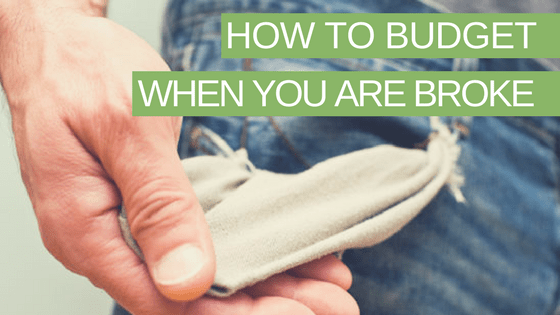If you spend 15 seconds searching on the internet, you will find thousands of articles about budgeting, why you need to budget, how to start budgeting, etc. The majority of these have a TON of useful information in them and I would definitely recommend you give them a read…
BUT
The majority of articles are aimed at people who know they need to budget and have the income to pay bills but maybe aren’t being as smart with their money as they should be. What about the other one third of Americans who are living paycheck to paycheck? Or even worse behind on their bills. If you have ever had more month than money then you know how difficult it is to create a budget because your expenses outweigh your income. So how do you budget when you are broke?
Let me be perfectly frank… This process of budgeting when you are broke is going to SUCK! You are going to have to swallow your pride and most likely wont be FUN.
Sounds great right??
But… When you dig yourself out of the hole and start to see your savings increase, that is when your sacrifice really begins to pay off. Change is hard, and becoming more financially sound is no different.
How to Create a budget when you are broke
When I was first year teacher I remember the day I received my first REAL paycheck. I actually received a paper check because it took a while to set up direct deposit. This was the day that all my hard work in college paid off. It was also the day that I SHOULD have received a speeding ticket…
After getting handed that checked I nearly sprinted out of the office so that I could deposit ALL that money. The urgency wasn’t excitement as one would think but FEAR. I needed to make that deposit in order to pay my bills on time! 24 hours later I paid all my bills and had a whopping 62 dollars and 19 cents left until next pay day. It was then I realized more than EVER I needed to learn to budget even if I was broke.
Step 0: Reflect on Spending
Before we even begin to think about making a budget we to stop and reflect about how we go into this situation. You must do is in order to understand where your family’s money is going. You need to reflect on all of your families expenses and purchases to better understand your financial situation. In order to dig out of the this hole, you really need to have a good understanding of how much money is coming in and how much money is going out. When I stopped and looked at what I was spending I needed to make a choice: make more money or slash the budget.
Sorry Starbucks… You are killing my budget!!!
Step 1: Identify Essentials
After you wiped your tears away realizing that you spent half of your paycheck on delicious doughnuts or pumpkin spiced lattes, it is time to get down to business. You must identify all essential expenses and all non-essential expenses. This will be key when we need make cuts from the budget.
For me it was easiest to jump into my bank statements and print the last 60 days of transactions. I selected 60 days because I did not want to miss any monthly expenses. I found when I selected 30 days, I would miss a bill because I either paid it early or it was just outside the 30 day window.
Next I want you to write or type all the expenses onto a sheet of paper or into a spreadsheet.
But Eric, we just printed it out. Isn’t that enough?!?
NO! There is just something about writing out your expenses that does something to your brain. It causes you to stop and really think about how you are spending your money. Spending money should be a painful event not a trip to Disney. Developing sound budgeting practices may be painful to begin but will pay off in the end.
Warning pain is coming…
If you were broke like I was that can mean only ONE thing… your expenses outweighed your income simple as that. This is the moment of truth.
You see all those expenses you just wrote down???
I want you to go through that list and identify anything that is Essential and then identify anything that is a Want. Include the average amount spent for the month.
Here was a list of my Essentials:
- Rent -$795
- Electric $100
- Water- $25
- Car loan- $210
- Food- $415
- Gas- $60
- Cell Phone- $95
- Car Insurance -$95
- Student loans- $225
- Basic House Hold (toilet paper, soap, etc): $65
Here was my list of Wants:
- Cable- $80
- Internet- Included with Cable
- Doughnuts and coffee… AHhhhhh! -$40
- Restaurants – $80
As you can see, I didn’t have a TON of wants but I did spend money on non-essentials. Be honest with yourself. Lying to yourself about your expenses will NOT help the situation.
Now I want you to identify ALL the income you receive per month. This could be regular job income, weekend side hustles, etc.
At that time my Total Income was about $2,275 per month.
Tally up all expenses and subtract total income…
-10!
This was an AVERAGE month. Sometimes my expenses were a bit more and sometimes they were a bit less. After 4 years of college, landing my dream job, I was now living paycheck to paycheck.
Step 2: Cut the Excess
The thing about a want is that it’s a want… Haha. Okay maybe not the most poetic but that is the reality. Wants are NOT needs no matter what anyone says.
For me, I HATED living paycheck to paycheck. I never wanted to live like that. I have goals and things I want to do with my money that I couldn’t do if I as living paycheck to paycheck. In order to make this work, you need to hate debt or hate not having money. There has to be a purpose behind what you are doing otherwise you will never see the light at the end of the tunnel and give up.
The first thing to go was my cable and internet.
Eric no internet?!? What??? Are you insane?
Here is a FUN fact. If you head on over to ANY public library you get FREE internet!!!
Next any food out which included my glorious morning doughnuts and coffee… This was replaced with coffee I made at home… People still do that you know.
Within a matter of minutes I cut out around 200 dollars from my monthly expenses!
Steve Jobs moment.
But WAIT there’s more…
You know all of those essentials that we listed… They are very subjective. They actually are not essential for EVERYONE. For instance one couple lived on $1000 a month. Not everyone needs a car or a cell phone. Unfortunately for me I really did need a car to get to work and I was locked into my lease for another 8 months on my apartment.
However there was still some more I could cut. The fun thing about car insurance is that they LOVE to compete with each other. A couple hours on the phone with various companies and I had dropped my car insurance by 20 BUCKS per month with the SAME coverage.
The same trick worked my cell phone company! At that point I was with Verizon and I hopped over to Tmobile reducing my cell phone budget by 30 dollars.
All and all I had reduced my expenses by around $250 dollars just by becoming more aware of my spending.
Step 2B What to do if you are behind on your bills
This step may not apply to everyone. Feel free to read or skip on down to step 3.
If you look at my spending you probably noticed that I was at -$10 before I started making cuts to my budget. I played the game of grace period. You know the time period that a company will allow you to pay a bill late without actually charging you late fees. This is a VERY dangerous financial game. I was one emergency away from a financial disaster. Fortunately for me, I got lucky but I hear from so many people telling me they are 2 or 3 months behind on bills that they can not start budget.
I am here to say “Yes, you can! But it’s going to suck!”
First and foremost you MUST pay for your rent or mortgage! Unless you have the opportunity to get out of the lease or mortgage, this is a non-negotiable. Electric, Food, and Water comes next. The car comes next depending on the situation. You want to identify all the ABSOLUTE essentials that you need in order to keep your job and keep income rolling in.
Identify all bills that you are currently behind on and determine how much you are behind.
The best case scenario is AFTER you slashed your budget, you will now have enough income to catch back up. If that is the case CONGRATULATIONS! You just dug yourself out of a hole move onto Step 3. If not we are going to have to swallow our pride.
Falling behind on your bills is embarrassing, I get it. Like I said, I was one emergency away from that same situation. But that is embarrassment is no excuse for not taking action. The longer you wait, the worse the situation gets.
Here is the thing about most companies, they are willing to work with you! It is CHEAPER for them to work with you to get caught up then it is for them to send you to the debt collection agency. At that point they have written it off as a loss. But if you call them and be honest, many companies will work to develop a plan with you.
Here are some tips when trying to negotiate past due bills:
- Remember, you spent or bought the item. The debt really is yours. Own it.
- Be kind. I know its cliché, but you get catch more flies with honey than you do with vinegar. If you are calling up their payment or collections team, know that they have been screamed at, cussed at, called names all day long. That is NOT going to help you get what you want. Speaking to them with respect and gratitude will go a LONG way.
- Understand how Tiers of Support work. In almost ALL cases, the first person on the phone will NOT be able to slash your bill or make adjustments to your payments. They are the gatekeepers to their managers or supervisors. This again makes it all the more necessary to be kind and courteous when speaking with them. When you get to a point in the conversation where you both agree that they cant help you, politely thank them for their time and ask if you can speak with their manager. Be truly gracious with them and thank them for everything but be firm that you would like to speak with someone who can help.
- Depending on the bill, you can use the “nuclear” option. Request to cancel your service. One, this might actually be something you NEED to do anyways. But two, this will usually get you routed to someone that will try to keep your business.
Step 3: Create an Actual Monthly Budget
Wait Eric didn’t we do this in Step 1???
Well sort of. Step 1 was triage to address the financial emergency. We will use the same information but it was more or less budgeting AFTER the money was spent which is never a good idea. Each month you are going to want to give your money a purpose BEFORE you spend it. That way we don’t ever get back into the same situation we just fixed.
Here is a SUPER SIMPLE FREE budget template I created for you to help you get started. The best part is that you can edit it any way you want! [mailerlite_form form_id=3]
Step 4: Create an Emergency Fund
In my article “Do You Need an Emergency Fund?… Yup!” I lay out the EXACT reasons why you NEED an emergency fund. At this point when I talk about emergency fund, I am not talking about 3-6 months of expenses. I am talking about the “Oh Crap! I just got a flat, now what?” emergency fund. These are both important but at this stage you will most likely want a mini-emergency fund.
Let me state what this fund is NOT for:
It is NOT for Emergency Doughnuts… delicious but not an emergency
It is NOT for I don’t want to cook tonight so lets eat out
It is NOT for I need those shoes, games, tools, etc
This fund is strictly for EMERGENCIES. Life happens and this fund will act as a shield between you and life.
Imagine living paycheck to paycheck and you get a flat…
What bill are you NOT going to pay… Exactly. You will be right back to the same spot we were in at Step 0.
Now imagine a different life where you have $1000 in an emergency fund and you get a flat.
YUP it still sucks!!! But guess what, you get the tire fixed and all your bills are still paid. See the difference J
Do it…
Step 5: Review and Adjust your Monthly Budget
As with everything in life it is so important to review your monthly budget often. You need to identify budget leaks. These are things that are not in the budget that you are spending money on OR they are items that you are spending slightly more on than was budgeted.
Budget leaks are not EVIL, but they just identify a problem that needs to be address in your budget.
For instance, when my wife and first started budgeting I set aside $400 for groceries each month. The first two months we kept going over. I was a bit annoyed because the BUDGET said $400. But guess what??? I actually didn’t do the shopping. I had NO idea what things cost and I was severally underestimating the cost of food. By identifying this leak, we were able to make adjustments necessary to make sure we budgeted appropriately. Identify the budget leaks and make appropriate changes either to the budget or your behavior.
As you catch up on your bills or receive more income, it will be necessary to rework your budget. That money needs a purpose.
Getting a raise does not give you permission to raise your spending…
Rather, pay off your debt faster using a debt snowball technique or even a debt avalanche technique. If you have crushed your debt plan for the future with that money.
Wrapping Up
Creating a budget when you are broke is going to be painful but the short term sacrifice will help you and your family in the months and years to come. You have to be willing to make a change in your lifestyle and in your spending habits in order to be successful.
The best part is that you can do it! Thousands of families have found themselves behind on their bills and gotten back on track and so can you. Follow the steps above, cutting out the excess, building a budget, and save $1000 for your emergency fund. Once you do, you’ll be well on your way to putting your family on a healthy financial path.
[mailerlite_form form_id=4]








Great post! There are certain things that people who are broke just shouldn’t purchase that would save them a ton of money. Coffee at a coffee shop, cable, new car, food outside of your home, etc…
You have to make sacrifices in order to get ahead.
Thanks Lance! I completely agree it is about sacrifice. Its all about opportunity cost. You can have a 5 dollar coffee today and struggle week to week or you can pay off your loans now so that you can have more later.
I think living below your means is the key to a good budget. Whether you are trying to get out of debt or you are in the accumulation phase, you always need to earn more than what you spend. If you earn less than you spend, you will fall into an ever-increasing amount of debt. With a good budget and proper planning, anyone can succeed.
I absolutely agree! Too many people try to keep up with the jones and it gets them into trouble.